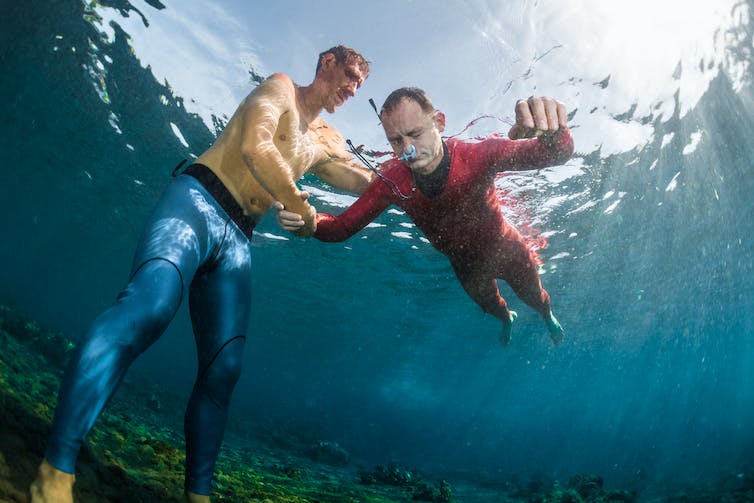
Kate Winslet reportedly held her breath for seven minutes and 15 seconds on set for Avatar: The Way of Water. Some of the movie’s scenes were filmed underwater.
It’s a remarkable feat; anyone (including professional freedivers) would acknowledge that a breath hold over seven minutes is extremely difficult. Most professional freedivers must train for years before reaching a number like that — many never achieve it. Winslet apparently trained only for a few weeks.
While Winslet now holds the record for a breath hold on a movie set, let’s put it in wider context. The current world record for breath holding, using a technique that is likely the same one the actor employed, is 24 minutes and 37 seconds. This is held by Budimir Šobat — a professional breath hold diver with whom I have worked closely.
Table of Contents
Longest recorded breath holds
I and other researchers have performed extensive physiologic measures on these professional divers to figure out how they can hold their breath for so long. One thing is certain: oxygen is important. In respect to the breath hold of almost 25 minutes by Šobat, it was accomplished by pre-breathing 100 per cent oxygen prior to holding the breath. Keep in mind the ratio of oxygen that we normally breathe in the atmosphere is 21 per cent.
The world record for a non-oxygen-assisted breath hold is 11:35 minutes* by Stéphane Mifsud. For women it is 9:02 minutes, held by Natalia Molchanova. These are people who have trained for many years, and are the top professional apneists (apnea means temporarily stopped breathing).
How did Winslet do it then? And if you were to try this, why is it that you (probably) couldn’t come close to seven minutes, even after a few weeks of training? You would need to do what Winslet likely did, and that is pre-breathe with 100 per cent oxygen before holding your breath. Winslet also most likely hyperventilated (breathed faster and deeper than normal) on the 100 per cent oxygen.
To understand how this can increase the breath hold time, a brief overview of the control of breathing is needed.
What happens when you hold your breath
The most important signal to breathe comes from clusters of specialized cells in your brain and neck called chemoreceptors. These chemoreceptors respond to the level of carbon dioxide (CO2) and, to a lesser extent, the level of oxygen (O2) in your blood (yes, CO2 is more important in this case).
There are also signals from the brain stem itself (central controller) and lungs (pulmonary stretch receptors), but they are generally less important in relation to the topic at hand. Accordingly, the rate and depth of breathing is primarily controlled by these chemoreceptors that maintain the optimal level of blood O2 and CO2.
During a breath hold, the level of blood CO2 rises, and the O2 declines. The initial increase in the urge to breathe — let’s say 30 seconds into the breath hold — primarily comes from the rising CO2. At a particular threshold, the chemoreceptors also respond to the declining O2, at which point the drive to breathe increases dramatically.
Eventually, the urge to breathe intensifies to the point that the diaphragm (the primary respiratory muscle) contracts involuntarily — referred to as an involuntary breathing movement. This is the point at which the untrained breath holder will typically break and begin to breathe again (around three minutes if motivated and oxygen-unassisted).
Pre-breathing oxygen
However, with prior O2 inhalation, the onset of involuntary breathing movements is dramatically delayed. There is no longer any signal from O2 sensing. With about 15 minutes of prior 100 per cent O2 inhalation, a breath hold can be extended to nearly 20 minutes and the blood oxygen will still be higher than normal.
Still, even with 100 per cent O2, CO2 (the primary stimulus for breathing) rises during the breath hold. However, fortunately for the oxygen-assisted breath holder, elevated blood O2 blunts the chemoreceptor response to CO2. The combined effect of an absent O2 response, and a dampened CO2 response, allows someone to hold their breath for much longer.

(Shutterstock)
Another trick is hyperventilating prior to breath holding. This will lower the initial blood CO2 levels. This lengthens the time before CO2 creeps above normal.
It’s important to note that hyperventilation before breath holding without prior 100 per cent O2 is dangerous in freediving because it increases the risk for shallow water blackout.
It’s likely that Winslet’s trainers had a keen understanding of respiratory physiology and that she benefited from that knowledge. Although Winslet’s impressive breath hold is a record on movie sets, it isn’t record-shattering off sets — even for previously untrained people.
Even as far back as 1959, researchers demonstrated in seven untrained volunteers that breathing 100 per cent O2 prior to a breath hold resulted in maximum breath hold durations of six to 14 minutes. So Winslet’s seven-minute breath hold with only a few weeks’ training is definitely possible.
*The International Association for the Development of Apnea (AIDA) is the recognized governing body for the apnea disciplines, which does not recognize apnea with 100 per cent oxygen-assisted breathing. Branko Petrovic holds an oxygen-unassisted breath hold of 11:54 minutes through Guinness World Records, not accredited through AIDA.
![]()
Anthony Bain receives funding from the National Science and Engineering Research Council (NSERC) of Canada.























